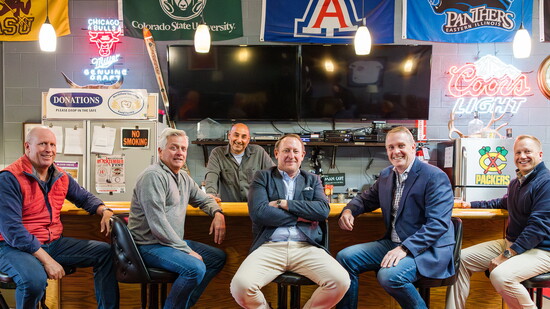Step inside the clubhouse of Making Life Better in Glenview and you are greeted by a scene equal parts neighborhood bar, college rec room and family basement. College flags line the walls, neon signs buzz softly above the bar, and flat-screen TVs wait for the next game. A pool table sits nearby, alongside dart boards, poker tables and a vintage arcade machine. At first glance, it looks like a place to blow off steam. But for the men who gather here, the space doubles as headquarters for something deeper.
Making Life Better (MLB) is not simply a social club. It is a nonprofit dedicated to building connection among men while fueling charitable work across the North Shore. The laughter and conversations come with purpose: friendships forged here often lead to fundraisers, service projects and mentorship efforts that ripple well beyond the clubhouse walls.
The spark came in 2014, when Glenview resident Larry Butler gathered a few friends from the Swainwood neighborhood with a modest proposal: contribute a small monthly fee to maintain the club, then use the extra funds to support local families. Nothing grand, just a few friends pooling resources and rolling up their sleeves. “I thought, maybe 15 or 20 guys,” Butler recalls. “We’d chip in, then decide where we could make a difference.”
The group’s first act—a $2,000 gift to the family of a Glenview police officer who died suddenly during roll call—set the tone. The money launched a college account for the officer’s children, but the impact was symbolic. From the beginning, MLB made clear it wanted to be personal, present and rooted in the community.
Today, the registered 501(c)(3) has raised more than $1 million for causes including Boys Hope/Girls Hope of Illinois, Youth Services of Glenview, the Northfield Township Food Pantry and Sister Paulanne’s Needy Family Fund.
Yet members will tell you the money is only part of the story. The real impact lies in showing up—sometimes with their children in tow—to pack meals, shop for gifts for underprivileged families, or hand-deliver supplies. “We wanted to show our kids how to give,” Butler explains. “It’s dads and kids side by side, learning what it means to serve.”
That blending of fellowship and philanthropy is what gives MLB, with current membership well beyond Butler’s original 15, its staying power. The clubhouse, once cobbled together with furniture from members’ basements, has become a fully outfitted hub where ideas turn into action.
Two annual events anchor the calendar. The MLB Golf Outing, held typically each June, draws players and sponsors from across the North Shore. September brings RocktemberFest, an outdoor music festival that has become a community fixture, complete with food, beer, and bands that keep the crowd moving long after the sun sets. Together, these events fuel the lion’s share of MLB’s giving, typically $75,000 to $90,000 each year.
But the group has never been content to coast. When the pandemic halted in-person events, the group improvised. Members set up a drive-thru barbecue in Glenview, raising $17,000 in one day for the food pantry. “That’s the kind of energy this group brings,” says current president Kevin Kachmarik. “It’s not just about writing checks. It’s about being present and being part of the solution.”
That presence also creates something harder to quantify: a sense of brotherhood. In an era when men often struggle to maintain friendships beyond quick texts or business networking, MLB provides a place to connect in person. The mix of professions and backgrounds is wide, but shared purpose flattens those differences. Around the bar or the pool table, men trade stories, share advice and, in the process, discover community.
Board member Ed Shabaz says it plainly: “I look back at the things we’ve done and I’m proud. Proud of the money raised, yes, but also of the families supported, the kids mentored, the neighbors helped.”
Ten years in, MLB is both a philanthropic force and a reminder of what happens when men carve out intentional space for connection. The neon signs and sports flags may suggest a man cave, but the heartbeat of the place is service.
Butler, who has since moved back to Virginia Beach, puts it this way: “If you’re going to build community, do it in your own backyard. Guys need guys. They need space to connect, recharge and be reminded of what they can do together.”
For Glenview, that reminder is written into the story of MLB: lives made better, friendships strengthened and a community bound closer by the work of men who simply decided to show up.
Learn more or get involved: mlbglenview.org.
